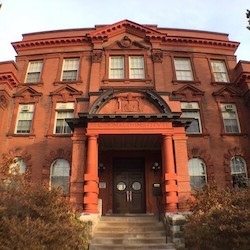Where the Rivers Meet: Decolonizing Place Narratives in the City

About the Project
As the practice of reciting land acknowledgements is increasingly adopted in public settings, residents of what is currently the City of Guelph are just beginning to learn that they are situated on the traditional lands of the Attawandaron (Neutral), the Treaty Lands of the Mississaugas of the Credit (MCFN) and within the Dish with One Spoon Territory. Despite this, dominant civic narratives and public discourses continue to centre settler histories and marginalize the historic and ongoing presence of Indigenous peoples in Guelph. With the goal of de-centring colonial histories and countering centuries of Indigenous erasure, this research project will explore Indigenous relationships to the rivers and surrounding lands in the City of Guelph to uncover, develop and share decolonizing narratives in the place where the Speed and Eramosa Rivers meet. Co-led by an Elder from Mississaugas of the Credit First Nation, an emerging artist from Six Nations of the Grand River and urban Indigenous residents and scholars in Guelph, this research explores the central question of "how can Indigenous relationships with and along the Speed and Eramosa Rivers re-shape understandings of the City of Guelph as an Indigenous place?"
Where the Rivers Meet is grounded in Indigenous theoretical work that calls for "re-storying" the erasure of Indigenous peoples in settler-colonial urban spaces. Our team will collect data from local archives, gather oral histories and conduct site visits to "re-read" places of historic and cultural significance. We will synthesize the research into a final museum exhibition that incorporates knowledge mobilization activities and outputs including alternative mapping, tours, performance art, digital storytelling, museum website contributions, and a final community feast. Equipped with extensive collective experience conducting decolonizing, community-engaged and land-based research, our team will build knowledge and public awareness around our (Indigenous and non-Indigenous) responsibility to and relationships with place.
Project Objectives:
(1) Research and develop Indigenous and decolonizing place narratives tied to the waters and surrounding lands in what is currently the City of Guelph.
(2) Provide opportunities for local Indigenous and non-Indigenous residents and students to participate in activities that encourage reflection on their relationships to local waters/lands and Indigenous peoples living in these waters/lands, past, present and future.
(3) Develop and implement arts- and land-based knowledge mobilization events and activities about decolonizing place narratives in Guelph, culminating in an exhibition at the Guelph Civic Museum.
(4) Consult and confer with stakeholders and community members about the next steps in working with Indigenous communities, treaty holders, institutions, stakeholders and residents of the City of Guelph and Wellington County towards future work on decolonizing place narratives.
This research work and methodology will be a significant addition to the small but growing body of decolonizing place narrative work in Canada. Our focus on water and Where the Rivers Meet will contribute to educating the public about Indigenous peoples in this era of Truth and Reconciliation and will have a positive impact on local Indigenous well-being through re-storying an Indigenous presence in the City.